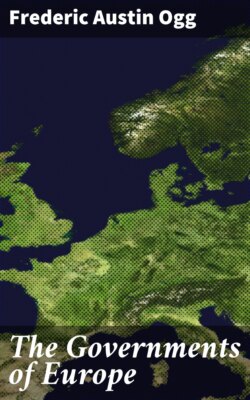Читать книгу The Governments of Europe - Frederic Austin Ogg - Страница 27
На сайте Литреса книга снята с продажи.
III. The Importance and Strength of the Monarch
Оглавление59. The Real Authority and Service of the Crown.—It would be an error, however, to conclude that kingship in England is unimportant, or even that the power wielded in person by the crown is negligible. On the contrary, the uses served by the crown are indisputable and the influence exerted upon the course of public affairs may be decisive. The sovereign, in the words of Bagehot, has three rights—the right to be consulted, the right to encourage, and the right to warn. "A king of great sense and sagacity," it is added, "would want no others."[76] Despite the fact that during upwards of two hundred years the sovereign has not attended the meetings of the cabinet, and so is deprived of the opportunity of wielding influence directly upon the deliberations of the ministers as a body, the king keeps in close touch with the premier, and cabinet councils at which important lines of policy are to be formulated are preceded not infrequently by a conference in which the subject in hand is threshed out more or less completely by king and chief minister. Merely because the ancient relation has been reversed, so that now it is the king who advises and the ministry that arrives at decisions, it does not follow that the advisory function is an unimportant thing. Queen Victoria many times wielded influence of a decisive nature upon the public measures of her reign, especially in respect to the conduct of foreign relations. The extent of such influence cannot be made a matter of record, because the ministers are in effect bound not to publish the fact that a decision upon a matter of state has been taken at the sovereign's instance. It is familiarly known, however—to cite a recent illustration—that Edward VII. approved and encouraged the Haldane army reforms, that he sought to dissuade the House of Lords from the rejection of the Lloyd-George budget of 1909, and that he discouraged the raising, in any form, of the issue of the reconstitution of the upper chamber. In other words while, as a constitutional monarch content to remain in the background of political controversy, the late king not only had opinions but did not hesitate to make them known; and in the shaping and execution of the Liberal programme his advice was at times a factor of importance.[77]
60. Why Monarchy Survives.—Monarchy in Great Britain is a solid and, so far as can be foreseen, a lasting reality. Throughout the tempestuous years 1909–1911, when the nation was aroused as it had not been in generations upon the issue of constitutional reform, and when every sort of project was being warmly advocated and as warmly opposed, without exception every suggested programme took for granted the perpetuation of the monarchy as an integral part of the governmental system. In the general bombardment to which the hereditary House of Lords was subjected hereditary kingship wholly escaped. The reasons are numerous and complex. They arise in part, though by no means so largely as is sometimes imagined, from the fact that monarchy in England is a venerable institution and the innate conservatism of the Englishman, while permitting him from time to time to regulate and modify it, restrains him from doing anything so revolutionary as to abolish it. That upon certain conspicuous occasions, as in the Cromwellian period, and again in 1688, kingship has owed its very life to the conservative instinct of the English people is well enough known to every student of history. But to-day, as ever, the institution rests upon a basis very much more substantial than a mere national predilection. Monarchy remains impregnably entrenched because the crown, in addition to comprising an accustomed feature of the governmental economy, fulfills specific ends which are recognized universally to be eminently worth while, if not indispensable. As a social, moral, and ceremonial agency, and as a visible symbol of the unity of the nation; king and court occupy an immeasurable place in the life and thought of the people; and even within the domain of government, to employ the figure of Lowell, if the crown is no longer the motive power of the ship of state, it is the spar on which the sail is bent, and as such it is not only a useful but an essential part of the vessel.[78] The entire governmental order of Great Britain hinges upon the parliamentary system, and nowhere has that system been reduced to satisfactory operation without the presence of some central, but essentially detached, figure, whether a king or, as in France, a president with the attributes of kingship. It is fundamentally because the English people have discerned that kingship is not necessarily incompatible with popular government that the monarchy has persisted. If royalty had been felt to stand inevitably in the path of democratic progress, it is inconceivable that all the forces of tradition could have pulled it through the past seventy-five or eighty years. As it is, while half a century ago there was in the country a small republican group which was fond of urging that the monarchy was but a source of needless expense, to-day there is hardly a vestige, in any grade of society, of anti-monarchical sentiment.[79]
